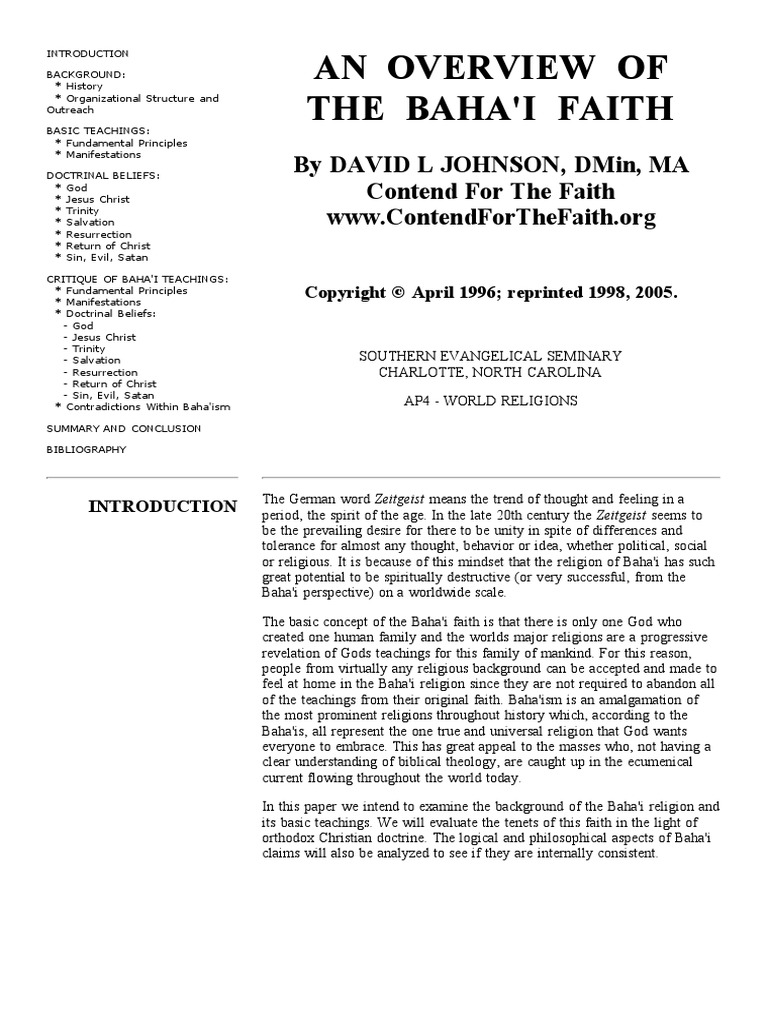The Baha’i Faith emerges as a profound spiritual doctrine that insists on the essential unity of all humankind, advocating for universal peace and the elimination of prejudice. Established in the mid-19th century by Baha’u’llah, the founder of the Faith, this religion emphasizes a diverse yet cohesive understanding of spirituality. For those intrigued by the tenets of the Baha’i Faith, numerous avenues exist for exploration and enlightenment.
In the quest for knowledge about the Baha’i Faith, one encounters a plethora of resources and methodologies that facilitate both academic inquiry and personal reflection. This article outlines various forms of content and engagement opportunities, providing a robust framework for those who wish to delve deeper into this transformative worldview.
1. Official Baha’i Resources
The official Baha’i website is an invaluable portal for newcomers and seasoned followers alike. It offers a compendium of teachings, administrative structures, and community-related activities. The site contains various sections, such as:
- Core Teachings: Here, the fundamental principles delineated by Baha’u’llah are succinctly presented. Concepts like the oneness of humanity, independent investigation of truth, and the harmony of science and religion encapsulate the Baha’i worldview.
- Historical Context: Understanding the historical backdrop of the Baha’i Faith enriches one’s comprehension. This section elucidates the life of Baha’u’llah, the sociopolitical circumstances of the 19th century, and the subsequent expansion of the Faith across the globe.
- Community Activities: An overview of local, national, and international initiatives undertaken by Baha’is to promote peace, education, and service to humanity provides insight into the active role of adherents.
2. Textual Exploration
Diving into the writings of Baha’u’llah, as well as those of other central figures such as Abdul-Baha and Shoghi Effendi, offers profound wisdom. The texts are replete with layers of meaning and require thoughtful contemplation. Key texts include:
- The Kitáb-i-Aqdas: This is considered the Most Holy Book of the Baha’i Faith. Its teachings lay the groundwork for Baha’i law and ethics.
- The Hidden Words: A poetic collection of spiritual aphorisms that articulate moral guidance.
- The Seven Valleys: This mystical work elucidates the spiritual journey one undertakes to attain closeness to God.
Reading these texts not only enhances understanding but also fosters a connection to the spiritual legacy of the Faith.
3. Multimedia Content
For those who prefer auditory or visual learning, a myriad of multimedia resources is available. Documentaries, podcasts, and lectures enrich one’s comprehension of the Baha’i teachings. Specifically, many reputable platforms feature:
- Documentaries: Films depicting the history and impact of the Baha’i Faith can provide context and narrative depth.
- Podcasts: Engaging discussions with scholars and practitioners of the Faith explore contemporary issues through a Baha’i lens.
- Webinars and Online Courses: Institutions offer structured learning opportunities facilitated by knowledgeable instructors.
This multimedia approach serves to diversify perspectives and potentially resonate with varied learning preferences.
4. Community Engagement
Experiential learning is paramount in comprehending the Baha’i Faith. Engaging with local Baha’i communities presents opportunities to experience the Faith firsthand. Key methods of involvement include:
- Attend Devotional Meetings: These gatherings foster spiritual reflection and collective prayer, allowing individuals to experience the community’s spiritual rhythm.
- Participate in Study Circles: Small group discussions focused on specific themes or texts enable deeper exploration of Baha’i principles in a supportive environment.
- Volunteer for Service Projects: Engaging in community service illuminates the Baha’i commitment to social justice and personal responsibility.
Such communal experiences cultivate an understanding of Baha’i values in action and elucidate the Faith’s emphasis on collaboration and service.
5. Scholarly Inquiry
For those inclined towards academia, the Baha’i Faith has garnered the attention of scholars across disciplines. Academic journals and publications provide in-depth analyses of the historical, theological, and sociological dimensions of the Faith. Institutions may offer:
- Research Papers: Published studies exploring Baha’i teachings in the context of modern issues can generate critical insights.
- Conferences: Attending or presenting at conferences focused on religious studies may connect curious individuals with leading experts.
- Thesis Programs: Graduate-level research can be conducted on various aspects of the Baha’i Faith, contributing to the broader academic discourse.
Such scholarly endeavors not only satisfy intellectual curiosity but also contribute to the ongoing development of Baha’i literature and teachings.
6. Informal Learning
Finally, for those who prefer a less structured approach, countless informal avenues exist for learning about the Baha’i Faith. Engaging in conversations with Baha’is, attending public talks, or browsing Baha’i-themed blogs allows for a more spontaneous discovery of teachings and principles.
In summary, for individuals curious about the Baha’i Faith, a wealth of resources awaits. From official texts and community engagement to scholarly research and informal learning, many pathways lead to a deeper understanding and appreciation of this vibrant and inclusive religion. The journey of learning is not merely an academic exercise but a profound spiritual adventure that invites every seeker to explore the depths of human existence and divine truth.
